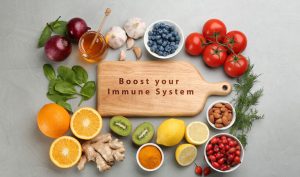Maintaining a healthy prostate is essential for men’s overall well-being, especially as they age. The prostate, a small gland that plays a key role in the male reproductive system, can be affected by conditions such as benign prostatic hyperplasia (BPH) or prostate cancer. Fortunately, a diet rich in specific nutrients can support prostate health and reduce the risk of related issues. Here are some of the best foods to include in your diet:
1. Tomatoes
- Why they help: Tomatoes are high in lycopene, an antioxidant that may help reduce the risk of prostate cancer and slow its progression.
- How to enjoy: Cooked or processed tomatoes (e.g., tomato paste or sauce) enhance lycopene absorption. Add them to soups, stews, or pasta dishes.
2. Fatty Fish
- Why they help: Salmon, mackerel, and sardines are rich in omega-3 fatty acids, which have anti-inflammatory properties and may help lower the risk of prostate disease.
- How to enjoy: Grill or bake fatty fish, or add canned options like tuna to salads and sandwiches.
3. Nuts and Seeds
- Why they help: Pumpkin seeds, in particular, contain zinc, which supports prostate health and may help reduce symptoms of BPH. Other nuts, like almonds and walnuts, provide healthy fats and antioxidants.
- How to enjoy: Snack on a handful of seeds or nuts or sprinkle them on salads and yogurt.
4. Green Tea
- Why it helps: Green tea is rich in catechins, a type of antioxidant that may help protect against prostate cancer and improve urinary function.
- How to enjoy: Sip on 1-2 cups of green tea daily, hot or iced.
5. Cruciferous Vegetables
- Why they help: Broccoli, cauliflower, Brussels sprouts, and kale contain sulforaphane, a compound that may reduce the risk of prostate cancer by targeting cancer cells.
- How to enjoy: Steam, roast, or stir-fry these vegetables for a nutrient-packed side dish.
6. Berries
- Why they help: Blueberries, strawberries, and raspberries are rich in antioxidants, which can help combat oxidative stress and inflammation that may affect prostate health.
- How to enjoy: Add fresh or frozen berries to smoothies, cereals, or yogurt.
7. Whole Grains
- Why they help: Whole grains like oats, quinoa, and brown rice are high in fiber, which promotes overall digestive health and may indirectly benefit prostate health by reducing inflammation.
- How to enjoy: Incorporate whole grains into breakfast bowls, salads, or as a base for your meals.
8. Legumes and Soy
- Why they help: Beans, lentils, and soy products like tofu and edamame contain isoflavones, plant-based compounds that may help protect against prostate cancer.
- How to enjoy: Use legumes in soups and stews or add tofu to stir-fries and salads.
9. Pomegranate
- Why it helps: Pomegranate is rich in antioxidants that may slow the growth of prostate cancer cells and reduce inflammation.
- How to enjoy: Drink unsweetened pomegranate juice or eat the fresh seeds as a snack.
10. Citrus Fruits
- Why they help: Oranges, lemons, grapefruits, and limes are high in vitamin C, which may help reduce inflammation and improve immune function.
- How to enjoy: Have citrus fruits as a snack, squeeze fresh lemon into water, or use lime in dressings.
11. Mushrooms
- Why they help: Certain mushrooms, like shiitake and maitake, contain compounds that may help support immune function and reduce inflammation in the prostate.
- How to enjoy: Add mushrooms to soups, stir-fries, or salads for a flavorful boost.
12. Garlic and Onions
- Why they help: Garlic and onions contain compounds that may reduce the risk of prostate cancer and support overall prostate health.
- How to enjoy: Use them as flavor enhancers in sauces, soups, and roasted vegetables.
Foods to Limit for Prostate Health
While adding beneficial foods is important, it’s equally vital to reduce or avoid:
- Processed meats: Linked to an increased risk of prostate issues.
- High-fat dairy: May increase the risk of prostate cancer.
- Sugary and fried foods: Can contribute to inflammation.
A balanced diet that includes these prostate-friendly foods, along with regular exercise and hydration, can support prostate health and overall well-being. Always consult with your healthcare provider for personalized dietary advice, especially if you’re managing a prostate condition.
A proactive approach today can lead to a healthier tomorrow—start incorporating these foods into your meals today!





